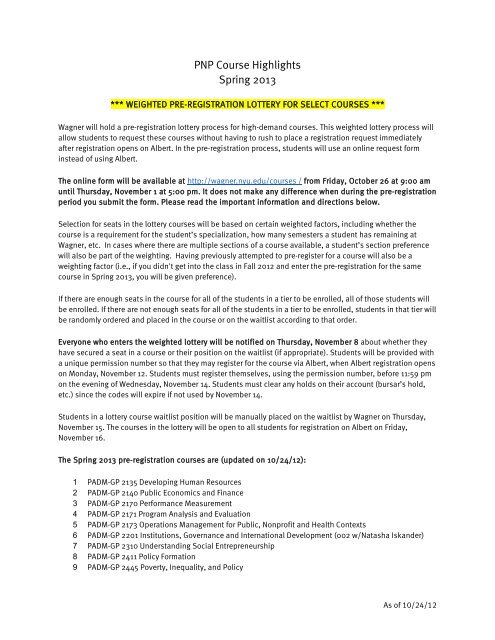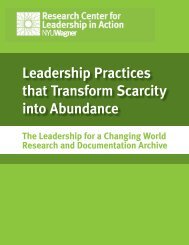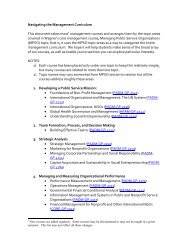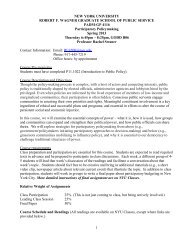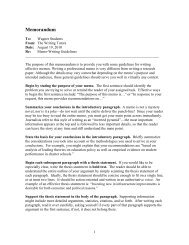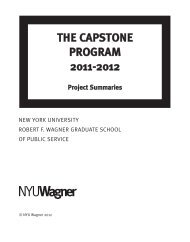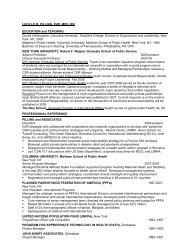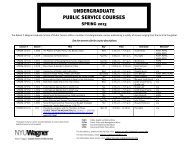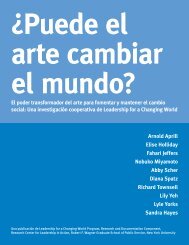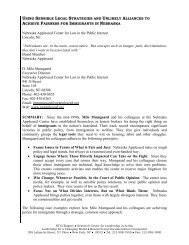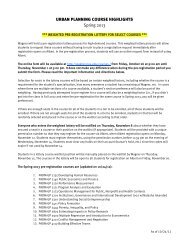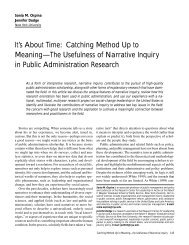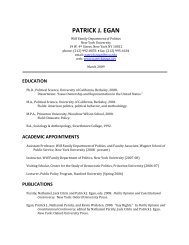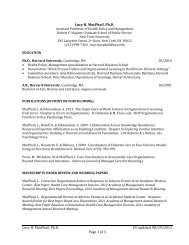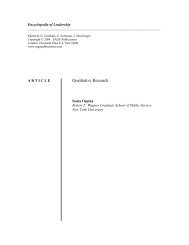Spring 2013 Course Highlights Template.docx - NYU Wagner
Spring 2013 Course Highlights Template.docx - NYU Wagner
Spring 2013 Course Highlights Template.docx - NYU Wagner
Create successful ePaper yourself
Turn your PDF publications into a flip-book with our unique Google optimized e-Paper software.
PNP <strong>Course</strong> <strong>Highlights</strong><br />
<strong>Spring</strong> <strong>2013</strong><br />
*** WEIGHTED PRE-REGISTRATION LOTTERY FOR SELECT COURSES ***<br />
<strong>Wagner</strong> will hold a pre-registration lottery process for high-demand courses. This weighted lottery process will<br />
allow students to request these courses without having to rush to place a registration request immediately<br />
after registration opens on Albert. In the pre-registration process, students will use an online request form<br />
instead of using Albert.<br />
The online form will be available at http://wagner.nyu.edu/courses / from Friday, October 26 at 9:00 am<br />
until Thursday, November 1 at 5:00 pm. It does not make any difference when during the pre-registration<br />
period you submit the form. Please read the important information and directions below.<br />
Selection for seats in the lottery courses will be based on certain weighted factors, including whether the<br />
course is a requirement for the student’s specialization, how many semesters a student has remaining at<br />
<strong>Wagner</strong>, etc. In cases where there are multiple sections of a course available, a student’s section preference<br />
will also be part of the weighting. Having previously attempted to pre-register for a course will also be a<br />
weighting factor (i.e., if you didn't get into the class in Fall 2012 and enter the pre-registration for the same<br />
course in <strong>Spring</strong> <strong>2013</strong>, you will be given preference).<br />
If there are enough seats in the course for all of the students in a tier to be enrolled, all of those students will<br />
be enrolled. If there are not enough seats for all of the students in a tier to be enrolled, students in that tier will<br />
be randomly ordered and placed in the course or on the waitlist according to that order.<br />
Everyone who enters the weighted lottery will be notified on Thursday, November 8 about whether they<br />
have secured a seat in a course or their position on the waitlist (if appropriate). Students will be provided with<br />
a unique permission number so that they may register for the course via Albert, when Albert registration opens<br />
on Monday, November 12. Students must register themselves, using the permission number, before 11:59 pm<br />
on the evening of Wednesday, November 14. Students must clear any holds on their account (bursar’s hold,<br />
etc.) since the codes will expire if not used by November 14.<br />
Students in a lottery course waitlist position will be manually placed on the waitlist by <strong>Wagner</strong> on Thursday,<br />
November 15. The courses in the lottery will be open to all students for registration on Albert on Friday,<br />
November 16.<br />
The <strong>Spring</strong> <strong>2013</strong> pre-registration courses are (updated on 10/24/12):<br />
1 PADM-GP 2135 Developing Human Resources<br />
2 PADM-GP 2140 Public Economics and Finance<br />
3 PADM-GP 2170 Performance Measurement<br />
4 PADM-GP 2171 Program Analysis and Evaluation<br />
5 PADM-GP 2173 Operations Management for Public, Nonprofit and Health Contexts<br />
6 PADM-GP 2201 Institutions, Governance and International Development (002 w/Natasha Iskander)<br />
7 PADM-GP 2310 Understanding Social Entrepreneurship<br />
8 PADM-GP 2411 Policy Formation<br />
9 PADM-GP 2445 Poverty, Inequality, and Policy<br />
As of 10/24/12
10 PADM-GP 2875 Estimating Impacts in Policy Research<br />
11 PADM-GP 2902 Multiple Regression and Introduction to Econometrics<br />
12 PADM-GP 4101 Conflict Management and Negotiation<br />
13 PADM-GP 4112 Building Effective Teams<br />
14 PADM-GP 4340 Digital Innovation Lab<br />
15 URPL-GP 2608 Urban Economics<br />
Weighted Pre-Registration Lottery Timeline: Quick View<br />
Friday, October 26 9:00 am Pre-registration Lottery Form is live at<br />
http://wagner.nyu.edu/courses/<br />
Thursday, November 1 5:00 pm Pre-registration Lottery Form closes<br />
Thursday, November 8 5:00 pm Students notified of Lottery request results- whether they have<br />
secured a seat in a course (and issued a permission code) or their<br />
position on the waitlist (on which they will be manually placed by<br />
Academic Services)<br />
Monday, November 12 9:00 am Students begin to register themselves on Albert using permission<br />
codes (if not on waitlist)<br />
Wednesday, November 14 11:59 pm Deadline for students to use permission codes<br />
Thursday, November 15 5:00 pm Students placed on Lottery course waitlists by Academic Services<br />
Friday, November 16 10:00 am Lottery courses are open to all students for registration on Albert<br />
Reminder: Students must clear any holds on their account (bursar’s hold, etc.) since the course registration<br />
permission codes for the lottery will expire if not used before Wednesday, November 14. The lottery process<br />
will not take into account any schedule conflicts. If you secure a seat in conflicting courses, you must choose<br />
which course to take and which to forego.<br />
If after reading through the instructions you have remaining questions, email<br />
wagner.academicservices@nyu.edu.<br />
*** IMPORTANT GENERAL NOTES ***<br />
Check Albert for Updated <strong>Course</strong> Meeting Dates, Times and <strong>Course</strong> Changes<br />
The course schedule is posted on <strong>Wagner</strong> website but it is important to always check Albert for the most<br />
updated information on courses. Albert may be updated daily, while the course schedules on the <strong>Wagner</strong><br />
website are updated once per week.<br />
As of 10/24/12
January Intersession courses included in <strong>Spring</strong> <strong>2013</strong> schedule<br />
<strong>Course</strong>s offered in January <strong>2013</strong> are included and in the <strong>Spring</strong> <strong>2013</strong> schedule on the <strong>Wagner</strong> website (search<br />
for “January”), and as part of <strong>Spring</strong> <strong>2013</strong> on ALBERT.<br />
Skills <strong>Course</strong>s<br />
Most skills courses are 2-credit courses (4000-level courses).<br />
Outside/University-wide Electives<br />
To view the University-wide list of courses that has been pre-approved by the <strong>Wagner</strong> faculty and may be taken<br />
as electives, visit http://wagner.nyu.edu/courses/otherlistings.php. This is a helpful tool that allows you to<br />
see non-<strong>Wagner</strong> courses listed by topic area, for example international development, social policy, education<br />
policy, nonprofit management, and more. We have made every effort to update non-<strong>Wagner</strong> course numbers,<br />
but you may need to consult with the department to verify new course numbers. For instructions on how to<br />
register for non-<strong>Wagner</strong> courses, see: http://wagner.nyu.edu/students/registration/outside<strong>Wagner</strong>.php.<br />
Pre-Term Workshops<br />
Pre-Term Workshops are open to all current students. Registration is completed through Albert. For more<br />
information on Pre-Term, consult the website: http://wagner.nyu.edu/current/services/preterm.php<br />
<strong>Course</strong>s by Semester<br />
To view an outline of when courses are typically offered, visit http://wagner.nyu.edu/courses/ and download<br />
the “<strong>Course</strong>s by Semester” documents for each program.<br />
Composing Your Career<br />
Dates and times for these workshops can be found in Albert and on the spring course schedule,<br />
http://wagner.nyu.edu/courses/. Students must submit pre-registration requests for the non-credit<br />
“Composing Your Career” workshops.<br />
Core <strong>Course</strong> Waiver Exams<br />
Students who do not qualify for an automatic course waiver (see waiver policies at:<br />
http://www.nyu.edu/wagner/current/registration/waivers.php) may write a waiver exam. The waiver schedule<br />
for May is posted on our website, and students can register online (at the link above). Waivers must be<br />
completed prior to the start of a student’s second semester.<br />
SPSS Proficiency Exam<br />
SPSS proficiency is a requirement for graduation. Students who waive Statistics (CORE-GP 1011) must<br />
demonstrate proficiency in SPSS by passing the SPSS examination (NONCR-GP 938) prior to starting Capstone<br />
or by completing PADM-GP 2902 Multiple Regression and Introduction to Econometrics. Register on Albert for<br />
the optional preparatory module (NONCR-GP 931) for the SPSS exam and for the exam (NONCR-GP 938).<br />
Students who take CORE-GP 1011 gain proficiency through their coursework.<br />
Labs/Recitations for Quantitative <strong>Course</strong>s<br />
Please note that the labs/recitations for the following courses are mandatory, but have been given separate<br />
course numbers:<br />
Statisitcs lecture: CORE-GP 1011; laboratory: CORE-GP 111<br />
Microeconomics lecture: CORE-GP 1018; recitation: CORE-GP 118<br />
Financial Management lecture: CORE-GP 1021; recitation: CORE-GP 121<br />
As of 10/24/12
Multiple Regression lecture: PADM-GP 2902; recitation: PADM-GP 290<br />
You must register the corresponding non-credit lab/recitation when you register for a lecture.<br />
Please note that PADM-GP 2140 Public Economics and Finance has an optional recitation section (PADM-GP<br />
140). It is not mandatory to register for this discussion when you register for the lecture, although it is highly<br />
recommended.<br />
*** SPRING <strong>2013</strong> COURSE INFORMATION ***<br />
(In addition to the courses on the following pages, there are course announcements listed on the<br />
International, MUP, and Health course highlight documents found here http://wagner.nyu.edu/courses/)<br />
~ new courses offered in January intersession (listed on spring schedule) ~<br />
PADM-GP 4132 Governance of Public/Private Finance: Policy, Law & Business (2 credits)<br />
Instructor: Richard Brodsky<br />
Day/Time: Tuesday/Thursday 6:00 pm - 9:00 pm<br />
Dates: 1/08/<strong>2013</strong> - 1/24/<strong>2013</strong><br />
Prerequisite: CORE-GP 1020<br />
Recently, traditional methods of capital flow between the private and public sector have undergone<br />
tremendous change. For many years the financial and social needs of both sectors were adequately addressed<br />
by traditional debt instruments, largely bonds and notes. Starting some years ago, there began a proliferation<br />
of new entities that now account for the bulk of public indebtedness. These have sprung up without serious<br />
examination of the reasons for their creation, their governance, their policies and practices, and their<br />
consequences. This course will examine all forms of these new structures, the law and reality of their<br />
operation, international, national and state efforts to monitor and control them, and their impacts on financial<br />
markets and government policies. The course will look at efforts by the IMF to rationalize and regulate<br />
Public/Private groups and by New York State to rationalize and democratize their governance, the application<br />
of fiduciary obligation to their operations, unintended legal and financial problems, and the unresolved<br />
financial, ethical, legal, policy and political questions that remain. Cases to be studied include the financing of<br />
the new Yankee Stadium, the TARP Fund, PATH, and the Norwegian Sovereign Wealth Fund. The course will<br />
include required readings, notable guest speakers from both public and private sectors, team case studies,<br />
and a final paper.<br />
PADM-GP 4340 Digital Innovation Lab (2 credits)<br />
Instructor: Yasmin Fodil (see bio below)<br />
Day/Time: Wednesday/Friday 2:00 pm - 6:00 pm<br />
Dates: 1/7/<strong>2013</strong> – 1/25/<strong>2013</strong><br />
Prerequisites: None<br />
Advances in the capabilities of digital technology to organize, create, and share information combined with<br />
the pervasiveness of personal technology devices has transformed our society in innumerable ways.<br />
Technology has also changed the way that institutions interact with and serve their constituents as evidenced<br />
through a number of interesting innovations in the field. The course will delve into several of these programs,<br />
such as: Code for America, which brings develops, designers and entrepreneurs into city government to help<br />
As of 10/24/12
the offices become more open and efficient; TurboVote, a tool that is trying to make voting as easy as possible<br />
by using the web to streamline the absentee voter registration process; the Transportation Security<br />
Administration (TSA) Blog which enables a dialogue with the public about their methods and guidelines,<br />
potentially improving the relationship between travelers and the agency; among others. This is a practical<br />
course that will help you gain the practical skills necessary to develop and refine a socially conscious digital<br />
innovation concept and bring it to fruition.<br />
Instructor Bio:<br />
Yasmin Fodil is the co-founder and director of BYO consulting, where she specializes in creative public policy<br />
making and how technology can be used to make government and organizations more collaborative,<br />
participatory, transparent, and accountable. She has worked at NASA's Goddard Space Flight Center on an<br />
internal communications plan for their engineering directorate and as an Information Officer for the Office of<br />
the Arts and Special Projects at the NYC Department of Education.She regularly blogs at<br />
wethegoverati.wordpress.com. Fodil has a Masters of Public Policy from the Harvard Kennedy School of<br />
Government and a Bachelors in Government from Cornell.<br />
PADM-GP 4413 Topics in Philanthropy (2 credits)<br />
Instructor: Gara LaMarche<br />
Day/Time: Tuesday/Thursday 6:00 pm - 9:00 pm<br />
Dates: 1/8/<strong>2013</strong> – 1/17/<strong>2013</strong><br />
Prerequisite: None<br />
Professor LaMarche will not be teaching his regular full semester Philanthropy course this spring. Instead he<br />
is offering the Topics in Philanthropy course during January. This course aims to introduce students to the<br />
critical role played by U.S. foundations on public policy issues and in American society generally.<br />
The manner in which the U.S. tax laws encourage charitable giving has had a significant impact on civil society<br />
and social welfare. Philanthropy has not only been critical to the establishment of leading educational and<br />
cultural institutions and medical research and discovery, but also to numerous public policy advances such as<br />
public television, urban renewal, school vouchers and the modern human rights and women’s rights<br />
movements.<br />
The course will touch on some of that history by way of a short introduction to institutionalized philanthropy,<br />
with particular emphasis on the foundations emerging in the first half of the 20th century from great American<br />
fortunes like Carnegie, Rockefeller, and Ford. But the principal focus will be the public policy activities of<br />
contemporary foundations. Proceeding from the legal and historical environment, the second class will<br />
examine number of key public policy approaches and strategies, including research, organizing and<br />
communications. The third class will be devoted to a more intensive case study of a particular philanthropysupported<br />
policy, and the final session will cover emerging and contested issues in policy-focused<br />
philanthropy.<br />
~ new courses offered in spring semester ~<br />
PADM-GP 2117 Information Management and Systems in Public and Nonprofit Service Organizations (4<br />
credits)<br />
Instructor: Derek <strong>Course</strong>n (new instructor; see bio below)<br />
Day/Time: Thursday 8:35 pm - 10:15 pm<br />
As of 10/24/12
Dates: 1/28/<strong>2013</strong> - 5/13/<strong>2013</strong><br />
Prerequisite: CORE-GP 1020<br />
The goal of this course is to prepare non-technical stakeholders working in the human service, justice and<br />
public health arenas to participate effectively in decision-making about information management practices<br />
and tools. Using a framework of general systems concepts to explore organizational and technical issues, the<br />
course will address how various roles—clients, front-line workers and supervisors, performance measurement<br />
staff, evaluators and funders—conceive of useful information; the challenges of developing information<br />
management capacity and acquiring information systems; and the context and implications of creating<br />
comparable measures and/or integrating data across multiple programs and agencies. The course is designed<br />
to enable students to understand differences between various stakeholder groups’ desire for and use of<br />
information; analyze the costs required to collect data and produce information; become familiar with the<br />
structure, development and customization of software; and the factors that contribute to success or failure.<br />
Students will also learn to understand the particular complex problems that client-serving agencies face<br />
around competing internal priorities, software acquisition, reporting to external funders, integration of data<br />
across multiple programs, and managing change; and learn how emerging trends in shared measurement and<br />
data integration may affect agencies.<br />
Derek <strong>Course</strong>n has 25 years of experience managing information in nonprofit organizations. He spent six<br />
years working on educational and journalistic projects in non-governmental organizations in Central America<br />
and four years planning immigrant services and managing performance data at Queens Borough Public<br />
Library. In 1998 he joined the Vera Institute of Justice, where he formed and led a department that carried out<br />
software development and performance measurement consulting work in areas including juvenile justice,<br />
child welfare, substance abuse treatment, offender re-entry, healthcare advocacy, crime mapping, court<br />
automation, and the interaction of race and prosecution. Derek joined Public Health Solutions in 2007, and<br />
currently directs planning and informatics around the administration of New York City’s portfolio of HIV care<br />
and prevention contracts, with particular emphasis on the development of systems for performance-based<br />
reimbursement. He holds M.S. degrees in management (<strong>NYU</strong> <strong>Wagner</strong>), information systems (Pace University)<br />
and information and library science (Pratt Institute).<br />
PADM-GP 2173 Operations Management for Public, Nonprofit and Health Contexts (4 credits)<br />
Instructor: Natalie Privett<br />
Day/Time: Tuesday 4:55 pm - 6:35 pm<br />
Dates: 1/28/<strong>2013</strong> - 5/13/<strong>2013</strong><br />
Prerequisites: CORE-GP 1020, CORE-GP 1011, and NONCR-932 Excel I (or equivalent)<br />
Operations management specifically involves the analysis, design, operation, and improvement of the<br />
systems and processes that deliver goods or services and ultimately outputs and outcomes. It is required to<br />
achieve the organization’s mission, provide value to the organization’s many stakeholders, and effectively<br />
translate policy into action. As such, operations management plays an important part of being an effective<br />
manager and policy implementer. In this course, we will develop a lens to perceive processes and systems in<br />
a variety of contexts along with an analytical toolbox to examine and understand these. Students will learn<br />
how to build basic operations models in Excel to make effective, evidence-based managerial, design, and<br />
policy decisions as well as gain defined analytical skills that lend themselves to roles in operations,<br />
management, hospital management, policy implementation, human services, consulting, and much more.<br />
PADM-GP 2310 Understanding Social Entrepreneurship (4 credits)<br />
As of 10/24/12
Instructor: Andrew Greenblatt<br />
Day/Time: Friday 9:00 am - 10:40 am<br />
Dates: 1/28/<strong>2013</strong> - 5/13/<strong>2013</strong><br />
Prerequisite: None<br />
The course description for this course will be updated shortly.<br />
PADM-GP 2425 Government 3.0: Rethinking Governance for the 21st Century (4 credits)<br />
Instructor: Beth Noveck<br />
Day/Time: Wednesday 4:55 pm - 6:35 pm<br />
Dates: 1/28/<strong>2013</strong> - 5/13/<strong>2013</strong><br />
Prerequisite: CORE-GP 1020<br />
We live in an era of unprecedented technological innovation with ingenious new advances for achieving clean<br />
energy, eradicating disease and providing greater wellness, more equitably and effectively delivering<br />
education, and improving the quality of human existence and expression. At the same time, we are<br />
experiencing clear deficits within centralized institutions of government and civil society: deficits of agility,<br />
innovation and capacity. These traditional institutions are failing to tap into the diversity of expertise and<br />
experience of individuals and communities, rendering us less able to quickly discover, recognize, implement<br />
and scale innovative approaches to pressing problems and making it impossible to translate technological<br />
innovation into social progress. New technology makes collaborative problem solving possible. In this course,<br />
we explore how we might use technology -- from big data to social media -- to redesign our systems of<br />
governance to devolve power from centralized, hierarchical institutions and evolve more robust collaboration<br />
among individuals, groups and institutions including government and the media. Through customized reading<br />
lists, blogging assignments, and a final design project participants will apply what we learn about innovation<br />
to the issues about which they are the most passionate.<br />
PADM-GP 2444 LGBT Issues in Public Policy<br />
Instructor: Sean Cahill<br />
Day/Time: Monday 4:55 pm - 6:35 pm<br />
Dates: 1/28/<strong>2013</strong> - 5/13/<strong>2013</strong><br />
Prerequisite: CORE-GP 1022<br />
The movement for equality for lesbian, gay, bisexual and transgender (LGBT) people is one of the most<br />
successful in recent history. In the U.S., even though LGBT people and same-sex couple families experience<br />
inequality and exclusion in a wide range of state and federal policy arenas, significant policy advances have<br />
occurred. These include the repeal of Don’t Ask, Don’t Tell, the adoption of transgender nondiscrimination<br />
laws in 16 states, the extension of marriage equality in eight states, and support for same-sex marriage by<br />
President Obama and the Democratic Party. This course will examine the incredible successes of LGBT rights<br />
activism in the U.S. and globally, and the treatment of LGBT people in several policy areas, with an in-depth<br />
focus on several issue areas that afford a broad overview of domestic and global LGBT policy, including:<br />
implementation of the Affordable Care Act; elder issues; youth and education policy; family recognition and<br />
the policy implications of race and gender differences among same-sex couple households; and international<br />
LGBT rights struggles. We will also examine debates within the U.S. LGBT movement between<br />
progressives/liberals and conservatives, and look at voting behavior and public opinion trends.<br />
PADM-GP 4143 Research Tools and Methods for Public Service (2 credits)<br />
Instructors: Shankar Prasad and Judy Polyne<br />
Day/Time: Wednesday 4:55 pm - 6:35 pm<br />
As of 10/24/12
Dates: 3/25/<strong>2013</strong> - 5/13/<strong>2013</strong><br />
Prerequisite: CORE-GP 1011<br />
Quantitative and qualitative methods are essential for effective policymaking. In addition to helping us<br />
identify social problems, we can use research to help determine causes of these problems, suggest potential<br />
solutions and evaluate effectiveness of existing programs. Most policy-relevant research questions can be<br />
addressed in many different ways, each with its own strengths and weaknesses. In this course, students will<br />
learn the formal principles of research design as they apply to both qualitative and quantitative methods.<br />
Students will also learn about the comparative advantages and disadvantages of different data collection<br />
methods. The primary goal of this course is to learn how to identify and evaluate alternative research designs<br />
and data collection strategies. These conceptual tools will help students become more sophisticated<br />
consumers and producers of research. A secondary goal is to provide a hands-on introduction to observing<br />
phenomena, conducting interviews, running focus groups and writing effective surveys.<br />
PADM-GP 4619 Arts, the Artist, and Public Art in Urban Revitalization (2 credits)<br />
Instructor: Tim Tompkins and Sherry Dobbin (see bio below)<br />
Day/Time: Tuesday 6:45 pm - 8:25 pm<br />
Dates: 1/28/<strong>2013</strong> - 3/15/<strong>2013</strong><br />
Prerequisite: CORE-GP 1022<br />
This seven-week course addresses the role of arts institutions, artists and public art in revitalizing cities, with<br />
an emphasis on comparative domestic and international examples of distinctive interventions and the larger<br />
lessons that can be drawn from them. We examine how the economic, geographic and social context shapes<br />
both art and its role with respect to public policy goals. Students will refine their ability to analyze existing<br />
projects and programs and plan creative interventions as tools for revitalizing cities. In the process, we will<br />
also examine and broaden the definition of public art. The class is appropriate for those interested in both<br />
public policy, planning and administration as well as arts-based practice and theory.<br />
Instructor Bio:<br />
Sherry Dobbin, Director of Public Art for Times Square Arts, the public art program of the Times Square<br />
Alliance. She brings over 20 years international experience across performance and visual arts, and art in the<br />
public realm, where she has worked as producer, administrator, consultant and curator. Prior to Times Square,<br />
she was the Director of Robert Wilson's The Watermill Center and a Project Director of arts-led regeneration<br />
throughout London and Eastern UK. She is a Fellow of the Royal Society of Arts (UK), and holds a Masters with<br />
Distinction from University of London, Birkbeck College in Cross-disciplinary Arts History and a BFA in Theater<br />
Studies from Boston University College of Fine Arts.<br />
URPL-GP 4237 Urbanization in Developing Countries (2 credits)<br />
Instructors: Solly Angel<br />
Day/Time: Thursday 8:35 pm - 10:15 pm<br />
Dates: 1/28/<strong>2013</strong> - 3/15/<strong>2013</strong><br />
Prerequisite: PADM-GP 2201<br />
The course focuses on understanding and coming to terms with the current prospects of global urban<br />
expansion. The first part of the course will focus on four propositions underlying a new paradigm for<br />
managing the rapid urbanization that can now be observed in developing countries: the inevitable expansion<br />
proposition, the sustainable densities proposition, the decent housing proposition, and the public works<br />
proposition. The second part of the course will focus on urbanization in a new historical perspective, on the<br />
As of 10/24/12
geography of world urbanization, and on the global hierarchy of cities. The third part of the course will explore<br />
the theory and the empirical evidence concerning global urban expansion by focusing on seven topics: global<br />
urban land cover and its expansion; the persistent decline in urban densities; from centrality to dispersal; the<br />
fragmentation of urban landscapes; the pulsating compactness of urban footprints; urban and cover<br />
projections 2000-2050; and urban expansion and the loss of cultivated land.<br />
~ application-only courses in spring <strong>2013</strong><br />
(these courses are not in the weighted pre-registration lottery) ~<br />
PADM-GP 2129 Race, Identity and Diversity in Organizations (4 credits)<br />
Instructor: Erica Foldy<br />
Day/Time: Wednesday 6:45 pm - 8:25 pm<br />
Dates: 1/28/<strong>2013</strong> - 5/13/<strong>2013</strong><br />
Prerequisites: CORE-GP 1020<br />
Note: This is an application-only course separate from <strong>Wagner</strong>’s Weighted Pre-Registration Lottery. In order to<br />
request registration, please fill out the form here. Applications should be no more than about a page.<br />
Applications will be accepted from now until Monday, October 29th. Students will be notified about<br />
registration results on November 8th. If you have questions, please contact Ann Lin at ann.lin@nyu.edu.<br />
This course brings together a wide range of thinking and scholarship about race and identity to encourage<br />
learning about what race is, why it matters, and racial dynamics in organizations. While recognizing the<br />
importance of intersectionality and other markers of difference such as gender and class, the course focuses<br />
on race for two reasons: 1) it is generally the most charged dimension of diversity in the United States, the<br />
most difficult to discuss and, therefore, the topic we most often avoid, and 2) it has the greatest impact on life<br />
chances and opportunities: race is often the best predictor of income, wealth, education, health, employment<br />
and other important measures of well-being. The course will roughly divide into two parts. The first part will<br />
address the phenomenon of race more broadly, while the second half will look more closely at organizations,<br />
especially public service contexts such as social services, health care and philanthropy.<br />
URPL-GP 2616 Colloquium on the Law, Politics, and Economics of Urban Affairs (4 credits)<br />
Instructor: Ingrid Gould Ellen<br />
Day/Time: We 2:00 pm - 3:50 pm<br />
Dates: 01/23/<strong>2013</strong> - 05/01/<strong>2013</strong><br />
Prerequisites: CORE-GP 1011 and either PADM-GP 2140 or URPL-GP 2608<br />
Note: This is an application-only course separate from <strong>Wagner</strong>’s Weighted Pre-Registration Lottery. In order to<br />
request registration, please fill out the form here. Applications should be no more than about one page.<br />
Submissions will be accepted from now until Monday, October 29th. Students will be notified about<br />
registration results on November 8th. If you have questions, please contact Joanne Williams at<br />
joanne.williams@nyu.edu.<br />
This course, taught jointly by faculty at <strong>NYU</strong> Law and <strong>Wagner</strong>, offers students an opportunity to explore the<br />
theoretical underpinnings of the leading current debates about such critical urban policy issues as whether<br />
and how to contain suburban sprawl; the impacts of various efforts to increase the production of affordable<br />
housing; and the successes and failures of efforts to improve and equalize the quality of education. The<br />
primary focus of the colloquium are discussions of works in progress by scholars from around the country,<br />
working in such disciplines as planning, law, public policy, and economics. In colloquium weeks, students<br />
participate in an in-depth discussion of the paper with the author. Students submit a short paper critiquing<br />
As of 10/24/12
the work in progress. In alternate weeks, students meet with faculty to discuss supplemental readings and<br />
learn the background necessary to understand each paper.<br />
PADM-GP 2411 – Policy Formation: Global<br />
Instructor: John Gershman<br />
Day/Time: Tuesday 6:45 pm – 8:25 pm<br />
Prerequisite: CORE-GP 1022<br />
~ course with international content added ~<br />
This course is offered every fall and spring, but this spring section will also include international content.<br />
~ courses with a new instructor for spring <strong>2013</strong> ~<br />
PADM-GP 2125 Foundations of Nonprofit Management (4 credits)<br />
Instructor: Paula Gavin (see bio below)<br />
Day/Time: Thursday 6:45 pm- 8:25 pm<br />
Dates: 1/28/<strong>2013</strong> - 5/13/<strong>2013</strong><br />
Prerequisite: CORE-GP 1020<br />
Instructor Bio:<br />
Paula L. Gavin is the newly appointed Executive Director of New York City’s Fund for Public Advocacy, which<br />
fosters innovative ideas to tackle challenges facing New York City and the nation, including providing<br />
education opportunities for immigrants, supporting small businesses and restraining corporate political<br />
spending. From 2007 - 2012 she served as President of National Urban Fellows, responsible for the overall<br />
vision, leadership and management of the organization. From 2004-2007, Gavin served as the founding<br />
Executive Director of the New York City Center for Charter School Excellence.. Paula was responsible for not<br />
only expanding the organization, but also managing academic and operational excellence initiatives, the<br />
development of good governance practices, and effective advocacy and positive positioning for the charter<br />
schools. Gavin also served for fourteen years as President and CEO of the YMCA of Greater New York.<br />
~ course moved from summer to spring <strong>2013</strong> ~<br />
PADM-GP 4250 Hunger and Food Security in a Global Perspective (2 credits)<br />
Instructor: John Gershman<br />
Day/Time: Monday 4:55 pm - 6:35 pm<br />
Dates: 3/25/<strong>2013</strong> - 5/13/<strong>2013</strong><br />
Prerequisite: CORE-GP 1018, CORE-GP 1011, and CORE-GP 1022<br />
Note: This 2-credit course meets in New York only (see PADM-GP 2250 for Ghana-based version, which meets<br />
in summer).<br />
This course explores the political and economic policy issues surrounding hunger and food security, drawing<br />
on many case examples and using Ghana as a case study. The course will provide an overview of some of the<br />
core dimensions of global hunger and food security policy issues, including debates over a new green<br />
revolution, food aid, fair trade, the impact of expanded biofuels production and the impact of the inter-related<br />
financial, food, and fuel crises.<br />
As of 10/24/12
~ courses not offered in spring <strong>2013</strong> ~<br />
PADM-GP 1901 – Reflective Practice: Learning from Work<br />
Instructor: Ellen Schall<br />
Not offered again until 2014<br />
PADM-GP 2178 – Power and Influence in Organizations and Politics<br />
Instructor: Joe Magee<br />
Not offered again until 2014<br />
PADM-GP 2236 – Protecting Rights and Promoting Development: Labor and Environmental Standards in<br />
the Global Economy<br />
Instructor: Salo Coslovsky<br />
Not offered again until 2014<br />
URPL-GP 2666 – Water Sourcing and Climate Change<br />
Instructor: Natasha Iskander<br />
Not offered again until 2014<br />
~ course no longer offered in summer (<strong>2013</strong> and thereafter) ~<br />
PADM-GP 2140– Public Economics and Finance<br />
Will be offered in <strong>Spring</strong> <strong>2013</strong> and Fall <strong>2013</strong><br />
For course descriptions (see “course listings”), course syllabi, course schedules, courses-bysemester,<br />
and program checksheets, go to: http://wagner.nyu.edu/courses/<br />
As of 10/24/12


